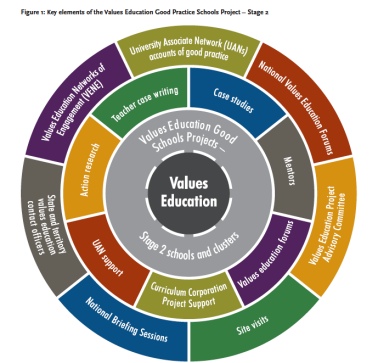New Research Publications from Australia’s Values Education Initiatives
Australia has been a leader in developing [url=http://www.valueseducation.edu.au/]system-wide values education initiatives[/url] since the release of the National Framework for Values Education in Australian Schools in 2005. Many of these projects have been studied and the research reports are now becoming available. Some recently released items that may be of interest to CRE Researchers are noted below.

[i]The Values Education Good Practice Schools Project – Stage 2 Final Report[/i] ([url=http://www.valueseducation.edu.au/verve/_resources/VEGPSP-2_final_3.pdf]Link to PDF[/url])
At the Heart of What We Do: Values Education at the Centre of Schooling – The Final Report of the Values Education Good Practice Schools Project – Stage 2 outlines the learnings and outcomes of twenty-five school clusters from around Australia that were funded by the Australian Government to design, implement and evaluate quality projects in values education which reflected and utilised the National Framework for Values Education in Australian Schools in local contexts.
Bezzina, Associate Professor Michael, Butcher, Professor Jude, [i]‘Promoting Interfaith and Intercultural Understanding in School Settings: Review of the Pilot Project’[/i] ([url=http://www.valueseducation.edu.au/verve/_resources/Interfaith_and_Intercultural_Review_Report.pdf]Link to PDF[/url]), produced for the Department of Education, Employment and Workplace Relations (DEEWR) by the Flagship for Creative and Authentic Leadership and the Institute for Advancing Community Engagement of the Australian Catholic University, 2008.
This mid-term review of the pilot program: Promoting Interfaith and Intercultural Understanding in School Settings (IIU) was carried out in the second year of the pilot which was conducted by Erebus International for DEEWR. The review concludes that the pilot has been successful in its own right, and in terms of the learning it has generated for the future. It documents significant shifts in people’s understandings and attitudes in the area of IIU and in the capacities of their schools. Recommendations are presented for the continued implementation of IIU.
Lovat, Professor Terence, Toomey, Professor Ron, Dally, Dr Kerry, Clement, Dr Neville, [i]‘Project to Test and Measure the Impact of Values Education on Student Effects and School Ambience’[/i], ([url=http://www.valueseducation.edu.au/verve/_resources/Project_to_Test_and_Measure_the_Impact_of_Values_Education.pdf ]Link to PDF[/url]). Final Report for the Australian Government Department of Education, Employment and Workplace Relations (DEEWR) by the University of Newcastle, 2009.
The study aimed to provide quantifiable and defensible data about links between values education practices and quality teaching outcomes. The research built on previous work, the Australian Council of Deans of Education Values Education Partnerships Project, in order to elaborate and strengthen, in an empirical sense, the findings of this study that argued that values education and quality teaching are closely linked. Its sites and case studies were drawn principally from schools that had engaged in the DEEWR-funded project, Values Education Good Practice Schools Project—Stage 2 (DEEWR, 2008). The research reviews and reports on how the explicit teaching of values impacted on a number of areas in school education. The research provides empirical evidence that values education had a positive impact on developing student-teacher relationships and improving school and classroom ambience, which led to more settled and productive classrooms. The report also documents the positive impact that values education can have on student and teacher wellbeing.
[i]‘Values and Other Issues in the Education of Young Australians: A study among parents with children at non-government schools’[/i], ([url=http://www.valueseducation.edu.au/verve/_resources/Values_and_Other_Issues_in_the_Education_of_Young_Australians.pdf]Link to PDF[/url]). A paper prepared for the Australian Parents Council and the former Department of Education, Science and Training, 2008.
The objective of this study was to explore attitudes to a range of issues among parents with children in non-government schools across Australia. The main focus of the study was on their perspectives on values education, the values parents wished to see inculcated in their children, and the role they expected school to play in that process. In addition to this, the study explored parents’ attitudes to choice of school, the concept of family–school partnerships, and school funding. The study found parents considered the Nine Values for Australian Schooling list to cover all the important values that young people should learn. It also found that when parents choose a primary school it is often based on religious and cultural affiliations and the school’s capacity to offer the right balance between academic standards and personal development, whereas parents choosing a secondary school are more likely to put the right balance between academic achievement and personal development at the top of the list.
